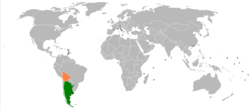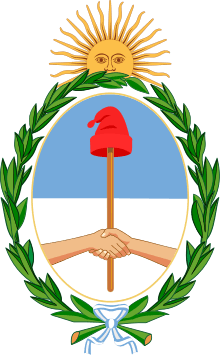Argentina–Bolivia relations
 |
|
Argentina |
Bolivia |
|---|---|
Argentina–Bolivia relations are foreign relations between Argentina and Bolivia. Both countries were part of the Spanish Empire, and share an international border.
History
Initially, both modern states of Argentina and Bolivia were part of the Viceroyalty of the Río de la Plata. Buenos Aires was by then the Capital city, and Bolivia was known as the Upper Peru. Buenos Aires ousted the viceroy in 1810, during the May Revolution, one of the starting points of the Spanish American wars of independence. The Upper Peru was heavily disputed during this war, and Buenos Aires sent three ill-fated military campaigns to secure the zone. The royalists in the Upper Peru would be ultimately defeated by Sucre, who came from the North.

The expansionist incursions of Andrés de Santa Cruz, head of the Peru-Bolivian Confederation, led both countries to war. However, the war was mainly between the Confederation and Chile. Argentina faced instead the French blockade of the Río de la Plata, imposed by France to support Santa Cruz.
Both countries are currently part of Mercosur, with Argentina being a full member and Bolivia an associated one. They are also members of the Union of South American Nations and the Organization of American States.
External links
- Bilateral treaties up to 1963 (Spanish)
- Bilateral treaties from 1964 to 1997 (Spanish)
- Bilateral treaties since 1998 (Spanish)
